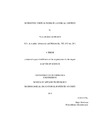| heal.creatorName | Βλαχάκης, Γεώργιος | el |
| heal.creatorName | Vlachakis, Georgios | en |
| heal.publicationDate | 2015-07-23T11:13:17Z | |
| heal.identifier.primary | http://hdl.handle.net/20.500.12688/3731 | |
| heal.abstract | Η παρούσα μεταπτυχιακή εργασία επικεντρώθηκε στη μελέτη εικονικών συνεργατικών ομάδων οι οποίες δρουν σε ένα μουσικό πλαίσιο. Αρχικά μελέτησε τη δικτυακή μουσική εκτέλεση παρουσιάζοντας κύριες εργασίες του παρελθόντος ενώ παράλληλα κατέγραψε τα κριτήρια τα οποία έχουν τεθεί από την επιστημονική κοινότητα, και τα οποία σκιαγραφούν τον τύπο μιας εφαρμογής δικτυακής μουσικής εκτέλεσης. Στη συνέχεια παρουσίασε τις κύριες μουσικές αναπαραστάσεις οι οποίες χρησιμοποιούνται τόσο από συστήματα μουσικής σύνθεσης αλλά και από συστήματα αναπαραγωγής μουσικής παρουσιάζοντάς τες ως προς τα affordances τα οποία προσφέρουν. Αποτέλεσμα της παρούσας εργασίας είναι ο σχεδιασμός και η δημιουργία ενός εργαλείου κατάλληλο να υποστηρίξει τη συνεργατική μουσική σύνθεση τόσο σύγχρονα όσο και ασύγχρονα. Η υλοποίηση του βασίστηκε εξολοκλήρου σε βιβλιοθήκες ανοικτού κώδικα, χρησιμοποιώντας βασικά διαδραστικά αντικείμενα για μουσική σημειογραφία και υπηρεσίες διαμοιρασμού και συγχρονισμού αρχείων. Επιπλέον έγιναν αρκετές παραμετροποιήσεις και προσθήκες για την υποστήριξη συγκεκριμένων σεναρίων χρήσης. | el |
| heal.abstract | During the last decade music collaboration has received substantial attention across a range of scholarships, including Human Computer Interaction (HCI) and Computer Supported Cooperative Work (CSCW), but the field is still wide open for further research and development. In contrast to commercially available stand-alone applications, collaborative toolkits are needed to provide sophisticated facilities for managing different types of data across a range of virtual work settings. In addressing this challenge, a key issue is the variety of representations in which music can be codified and the different affordances supported by each representation. For instance, audio, symbolic musical notations and textual descriptions are three popular music representations, with each affording different articulation and set of practices, thus making them appropriate for certain types of collaborative work in virtual settings. Recently researchers [15] based on semiotics categorized virtual work on the grounds of what is being virtualized, the object of work and the operations through which distributed organizing takes place. This stream of research distinguishes between work as operating on, with and within or through representations. Accordingly, a variety of virtual work scenarios are envisaged and anchored as ‘virtual teams’, ‘remote control’ and ‘simulations’. Other research concentrates on the role of representations in remediating practices [18] and the socio-material features that shape collaborative computing across technological regimes, including Web 2.0 [33]. In the light of these theoretical threads, this thesis sets out to investigate and provide tools that support virtual work in a musical context. The key focus is on enabling remote users to co-engage [31] (both asynchronously and synchronously) in a mix of practices involving different representations so as to meet a joint agenda e.g., composing a piece of music, dictating lyrics on scores, learning music theory, etc. Of particular interest is to address issues related to synchronizing different music representations in conference settings and facilitate design-oriented challenges such as turn-taking for symbolic action, social translucence, activity awareness and interoperability of representations. These challenges are known to emerge in settings where participants need to streamline their efforts so as to coordinate operations. However, as the focus is on multi-site / multi-user co-engagements where participants need not have the same understanding about music, or possess the same level of expertise, the implication of different representations to convey meaning is compelling. Then, supporting peer negotiation, activity awareness and interoperability across representations are of paramount importance and critical factors of success. | en |
| heal.language | el | |
| heal.academicPublisher | Τ.Ε.Ι. Κρήτης, Σχολή Τεχνολογικών Εφαρμογών (Σ.Τ.Εφ), ΠΜΣ Πληροφορική και Πολυμέσα | el |
| heal.academicPublisher | T.E.I. of Crete, School of Engineering (STEF), MSc in Informatics and Multimedia | en |
| heal.title | Υποστήριξη εικονικής εργασίας σε μουσικό πλαίσιο. | el |
| heal.title | Supporting virtual work in a musical context. | en |
| heal.type | masterThesis | |
| heal.keyword | υπολογιστικά συστήματα υποστήριξης συνεργασίας, αλληλεπίδραση ανθρώπου υπολογιστή, μουσική σύνθεση, διαδικτυακή μουσική εκτέλεση | el |
| heal.keyword | computer-supported cooperative work, human computer interaction, music composition, network music performance | en |
| heal.advisorName | Ακουμιανάκης, Δημοσθένης | el |
| heal.advisorName | Akoumianakis, Dimosthenis | en |
| heal.academicPublisherID | teicrete | |
| heal.fullTextAvailability | true | |
| tcd.distinguished | false | |
| tcd.survey | false | |


